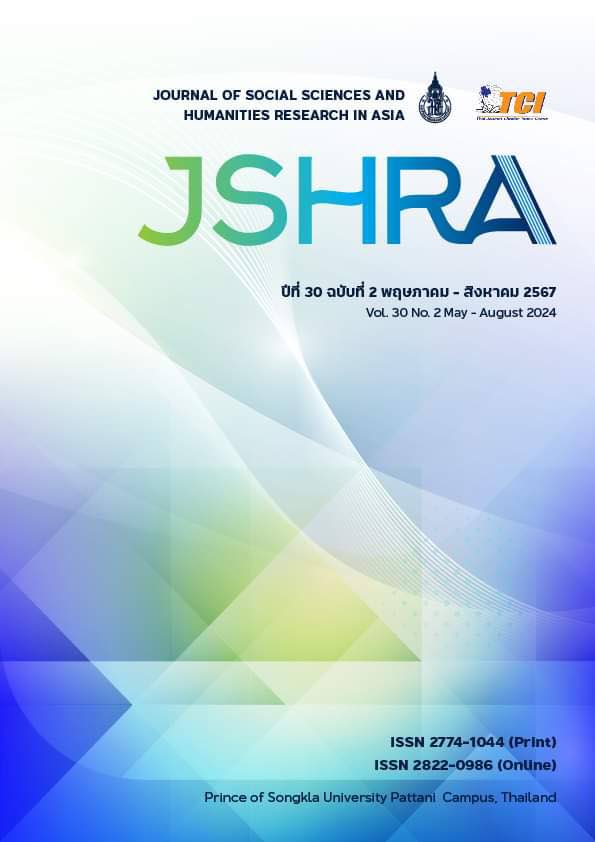Enablers and Barriers to Supply Chain System of Sports Tourism Management in Suphanburi Province
Keywords:
Barriers, Enablers, Sports Tourism, Tourism Supply ChainAbstract
The study aimed to examine the factors that both facilitate and hinder the supply chain system in sports tourism management in Suphanburi Province. To achieve this, the researcher conducted qualitative research through documentary analysis and in-depth interviews. The participants included 20 stakeholders involved in sports tourism in Suphanburi Province, comprising executives from sports tourism establishments, tourism personnel, tourists, and academicians. The data were analyzed descriptively. The findings indicated several internal issues within the supply chain of sports competition management in Suphanburi Province. These included challenges in establishing connections between tourist attractions, developing personnel, enhancing tourist appeal, organizing events, managing public relations, providing enriching experiences for travelers, and promoting sports tourism strategies. External challenges faced by these business groups in organizing sports events included the impact of the COVID-19 pandemic, limited support from the private sector, budget constraints from the government, technological barriers, insufficient hotel facilities, and difficulties in encouraging active participation in activities. On the positive side, internal supporting factors for these business groups included the province's rich history, and the readiness of its infrastructure, personnel, community, and residents. External supporting factors included the province's selection as a sports city, favorable geographical features, and the presence of government agencies to oversee and support sports tourism activities. The research also proposed guidelines for developing a sports strategy that aligns with the strengths and potential of the supply chain system in Suphanburi Province.
References
Abdel Azim Ahmed, T.S. (2017). A triple bottom line analysis of the impacts of the Hail International Rally in Saudi Arabia. Managing Sport and Leisure, 22(4), 276-309.
Ahmed, Q.A., & Memish, Z.A. (2020). The cancellation of mass gatherings (MGs)? Decision making in the time of COVID-19. Travel Medicine and Infectious Disease, 34, 101631.
Alexandris, K., & Kaplanidou, K. (2014). Marketing sport event tourism: Sport tourist behaviors and destination provisions. Sport Marketing Quarterly, 23(3), 125.
Amir, A.F., Abd Ghapar, A., Jamal, S.A., & Ahmad, K.N. (2015). Sustainable tourism development: A study on community resilience for rural tourism in Malaysia. Procedia-social and behavioral sciences, 168, 116-122.
Azis, N., Amin, M., Chan, S., & Aprilia, C. (2020). How smart tourism technologies affect tourist destination loyalty. Journal of hospitality and tourism technology, 11(4), 603-625.
Baade, R.A., Baumann, R.W., & Matheson, V.A. (2011). Big men on campus: Estimating the economic impact of college sports on local economies. Regional Studies, 45(3), 371-380.
Bai, H., & Ran, W. (2022). Analysis of the vulnerability and resilience of the tourism supply chain under the uncertain environment of COVID-19: A case study based on Lijiang. Sustainability, 14(5), 2571.
Berdnikov, M., O’Reilly, N., & Abeza, G. (2021). Exploring the involvement of athletes in influencing
a host country’s image via social media: the case of the Rio 2016 Olympic Games. International Journal of Sport Management and Marketing, 21(3-4), 209-225.
Bhatia, D.K. (1999). Event tourism market emerging. Hotel & Motel Management, 214(15), 26-26.
Clark, J., & Kearns, A. (2015). Pathways to a physical activity legacy: Assessing the regeneration
potential of multi-sport events using a prospective approach. Local Economy, 30(8), 888-909.
Collins, A., & Cooper, C. (2017). Measuring and managing the environmental impact of festivals:
The contribution of the Ecological Footprint. Journal of Sustainable Tourism, 25(1), 148-162.
Collins, A., & Potoglou, D. (2019). Factors influencing visitor travel to festivals: Challenges in encouraging sustainable travel. Journal of Sustainable Tourism, 27(5), 668-688.
Custódio Santos, M., Ferreira, A., Costa, C., & Santos, J.A.C. (2020). A model for the development
of innovative tourism products: From service to transformation. Sustainability, 12(11), 4362.
Da Silva, E.C., & Las Casas, A.L. (2017). Sport fans as consumers: An approach to sport marketing. British Journal of Marketing Studies, 5(4), 36-48.
Daniels, M.J., & Norman, W.C. (2003). Estimating the economic impacts of seven regular sport tourism events. Journal of sport tourism, 8(4), 214-222.
Deccio, C., & Baloglu, S. (2002). Nonhost community resident reactions to the 2002 Winter Olympics: The spillover impacts. Journal of travel research, 41(1), 46-56.
Dwyer, L. (2005). Relevance of triple bottom line reporting to achievement of sustainable tourism: A scoping study. Tourism Review International, 9(1), 79-938.
Getz, D., & Page, S.J. (2016). Progress and prospects for event tourism research. Tourism management, 52, 593-631.
Gibson, H.J., Walker, M., Thapa, B., Kaplanidou, K., Geldenhuys, S., & Coetzee, W. (2014). Psychic income and social capital among host nation residents: A pre–post analysis of the 2010 FIFA World Cup in South Africa. Tourism management, 44, 113-122.
González-Torres, T., Rodríguez-Sánchez, J.L., & Pelechano-Barahona, E. (2021). Managing relationships in the Tourism Supply Chain to overcome epidemic outbreaks: The case of COVID-19 and the hospitality industry in Spain. International journal of hospitality management, 92, 102733.
Gössling, S. (2021). Tourism, technology and ICT: A critical review of affordances and concessions. Journal of Sustainable Tourism, 29(5), 733-750.
Hall, C.M. (1992). Adventure, sport and health tourism, Special Interest Tourism, B. Weile, CM Hall.
Hemmonsbey, J., & Tichaawa, T. M. (2020). Brand messages that influence the sport tourism experience: the case of South Africa. Journal of Sport & Tourism, 24(3), 177-194.
Henderson, J.C. (2014). Hosting the 2022 FIFA World Cup: opportunities and challenges for Qatar. Journal of Sport & Tourism, 19(3-4), 281-298.
Higham, J., & Hinch, T. (2018). Sport tourism development (Vol. 84). Channel view publications.
Hosseini, K., Stefaniec, A., & Hosseini, S.P. (2021). World Heritage Sites in developing countries: Assessing impacts and handling complexities toward sustainable tourism. Journal of Destination Marketing & Management, 20, 100616.
IJspeert, R., & Hernandez-Maskivker, G. (2020). Active sport tourists: Millennials vs baby boomers. Journal of Tourism, Heritage & Services Marketing (JTHSM), 6(2), 12-20.
Ioannides, D., & Zampoukos, K. (2018). Tourism’s labour geographies: Bringing tourism into work and work into tourism. Tourism Geographies, 20(1), 1-10.
Jain, A., Shanker, S., & Barve, A. (2022). Resilience against the COVID-19 pandemic: is the hotel and tourism supply chain on the right path?. Benchmarking: An International Journal, 29(10), 3194-3225.
Jamieson, N. (2014). Sport tourism events as community builders—how social capital helps the “locals” cope. Journal of Convention & Event Tourism, 15(1), 57-68.
Jeong, Y., & Kim, S. (2020). A study of event quality, destination image, perceived value, tourist satisfaction, and destination loyalty among sport tourists. Asia Pacific Journal of Marketing and Logistics, 32(4), 940-960.
Jiang, X., Kim, A., Kim, K., Yang, Q., García-Fernández, J., & Zhang, J.J. (2021). Motivational antecedents, value co-creation process, and behavioral consequences in participatory sport tourism. Sustainability, 13(17), 9916.
Joewono, T.B., & Kubota, H. (2006). Safety and security improvement in public transportation based on public perception in developing countries. IATSS Research, 30(1), 86-100.
Kandampully, J. (2000). The impact of demand fluctuation on the quality of service: A tourism industry example. Managing Service Quality: An International Journal, 10(1), 10-19.
Kim, S.S., & Petrick, J.F. (2005). Residents’ perceptions on impacts of the FIFA 2002 World Cup: The case of Seoul as a host city. Tourism Management, 26(1), 25-38.
Latiff, K., & Imm, N.S. (2015). The Impact of Tourism Service Quality on Satisfaction. Journal of Economics and Management, 9(S), 67-94. http://psasir.upm.edu.my/id/eprint/41750/1/The%20Impact%20of%20Tourism%20Service%20Quality%20on%20Satisfaction.pdf
Lebrun, A.M., Su, C.J., & Bouchet, P. (2021). A more sustainable management of domestic tourists in protected natural parks: A new trend in sport tourism after the COVID-19 pandemic?. Sustainability, 13(14), 7750.
Lesjak, M., Axelsson, E.P., & Uran, M. (2014). The perceived social impacts of the EuroBasket 2013 on Koper residents. Academica Turistica, 7(2), 53-68.
Liu, D., Hautbois, C., & Desbordes, M. (2017). The expected social impact of the Winter Olympic Games and the attitudes of non-host residents toward bidding: The Beijing 2022 bid case study. International Journal of Sports Marketing and Sponsorship, 18(4), 330-346. http//doi.org/10.1108/IJSMS-11-2017-099
Macintosh, E., & Dill, S. W. (2017). The athletes’ perspective. In Routledge Handbook of Sports Event Management (pp. 125-138). Routledge.
Martín García, M.D. M., Ruiz-Real, J.L., Gázquez-Abad, J.C., & Uribe-Toril, J. (2024). Sports Tourism in the New Normal. In Tourist Behaviour and the New Normal, Volume I: Implications for Tourism Resilience (pp. 187-200). Cham: Springer Nature Switzerland.
Matheson, V., & Baade, R. (2004). Mega-sporting events in developing nations: playing the way to prosperity?. Retrieved September 1, 2022, from https://crossworks.holycross.edu/econ_working_papers/102/
Mihajlović, I. (2017). The importance of local events for positioning of tourist destination. European Journal of Social Science Education and Research, 4(4), 228-239.
Monterrubio, C. (2017). Protests and tourism crises: A social movement approach to causality. Tourism Management Perspectives, 22, 82-89.
Park, J., Kim, M., Nauright, J., & Kim, Y. H. (2020). Sport event tourists’(SET’s) behavior: A case study of the PyeongChang Winter Olympics. International Journal of Sports Marketing and Sponsorship, 21(2), 267-284.
Potwarka, L., Ramchandani, G., Castellanos-García, P., Kokolakakis, T., Teare, G., & Jiang, K. (2021). Beyond the host nation: An investigation of trickle-down effects in the ‘Hometowns’ of Canadian athletes who competed at the London 2012 Olympic Games. European Sport Management Quarterly, 1-20
Prashyanusorn, V., Kaviya, S., & Yupapin, P.P. (2010). Surveillance system for sustainable tourism with safety and privacy protection. Procedia-Social and Behavioral Sciences, 2(1), 74-78.
Prayag, G., Hosany, S., Nunkoo, R., & Alders, T. (2013). London residents’ support for the 2012 Olympic Games: The mediating effect of overall attitude. Tourism Management, 36, 629-640.
Program Management Unit for Competitiveness. (2021). COVID-19 on the Thai Tourism Sector: Impacts and Solutions. Retrieved June 10, 2022, from https://www.mots.go.th/download/BannerLink/PBVol01Covid_DigitalEd.pdf
Reis, A. C., Frawley, S., Hodgetts, D., Thomson, A., & Hughes, K. (2017). Sport participation legacy and the Olympic Games: The case of Sydney 2000, London 2012, and Rio 2016. Event management, 21(2), 139-158.
Ritchie, B. W., Shipway, R., & Cleeve, B. (2009). Resident perceptions of mega-sporting events: A non-host city perspective of the 2012 London Olympic Games. Journal of Sport & Tourism, 14(2-3), 143-167.
Smith, A. (2010). The development of “sports-city” zones and their potential value as tourism resources for urban areas. European Planning Studies, 18(3), 385-410.
Suphanburi Provincial Office. (2018). Suphanburi Province Development Plan 2018 - 2022 (Review Edition). Retrieved April 15, 2021, from https://ww1.suphanburi.go.th/strategic
Tapper, R., & Font, X. (2004). Tourism supply chains. Retrieved November 4, 2023, from https://icrtourism.com.au/wp-content/uploads/2012/09/TourismSupplyChains.pdf
Toohey, K., & Taylor, T. (2008). Mega events, fear, and risk: Terrorism at the Olympic Games. Journal of sport management, 22(4), 451-469.
Wangpratam, S. (2010). From Hero to Celebrity: Communication and the Image Making of Thai Football Stars. (Master in Mass Communication). Thammasat University. https://doi.nrct.go.th/ListDoi/listDetail?Resolve_DOI=10.14457/TU.the.2010.278
Wattanakuljarus, A. (2021). COVID-19 and Its Impact on Employment in the Thai Tourism Sector. Retrieved June 22, 2022, from http://econ.nida.ac.th/covid19/covid-19-anan.pdf
Wise, N., & Whittam, G. (2015). Special edition: Regeneration, enterprise, sport and tourism. Local economy, 30(8), 867-870.
Zhang, X., Song, H., & Huang, G. Q. (2009). Tourism supply chain management: A new research agenda. Tourism management, 30(3), 345-358.










